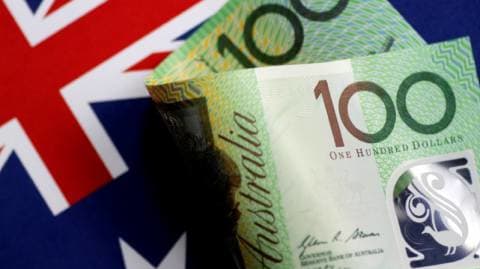
By Wayne Cole and Charlotte Greenfield
SYDNEY/WELLINGTON (Reuters) - The Australian and New Zealand dollars eased on Tuesday as Asian share markets slipped into the red, while Australia's central bank again underlined the outlook for unchanged policy at home.
The Aussie
The New Zealand dollar
A lack of risk appetite was a drag with Asian shares following Europe lower on Tuesday while U.S. Treasury yields nudged back up towards recent highs.
Treasury has a record-breaking $258 billion of debt to sell this week as the U.S. budget deficit expands, a trend which could ultimately pressure both bonds and the U.S. dollar.
"In order to attract ever-increasing amounts of foreign capital to fund widening deficits the U.S. needs to offer either higher real interest rates or a cheaper asset purchase price - weaker dollar," said Ray Attrill, head of FX strategy at NAB.
"Or, of course, some combination of the two – hence the coexistence of higher nominal U.S. rates and a weaker dollar."
That is a major reason the Aussie has stayed resilient even as U.S. cash rates look certain to rise above those in Australia this year, a rare event last seen in the late 1990s.
Minutes from the Reserve Bank of Australia's (RBA) last policy meeting showed it was in no hurry to hike as wage growth and inflation remained much too weak for comfort.
"This is why the RBA has been downplaying the chances of an interest rate rise this year and why we suspect the first hike may not come until the second half of next year," Paul Dales, chief Australia economist at Capital Economics.
The futures market implies around a 40 percent chance of a rate rise by August <0#YIB:> and is not fully priced for a move to 1.75 percent until next February.
The policy outlook is much the same in New Zealand, where the central bank has indicated a first move might come until mid-2019.
More immediate for the kiwi will be a global auction of dairy, the country's biggest goods export.
"The GDT dairy auction overnight has more potential to cause movement if it was substantially different from indicators and our expectation of a flat to small rise," said Doug Steel, senior economist at BNZ Bank, in a research note.
New Zealand government bonds <0#NZTSY=> eased, sending yields 1.5 basis points higher at the long end of the curve.
Australian government bond futures slipped in sympathy with Treasuries, with the three-year bond contract
(Editing by Simon Cameron-Moore)